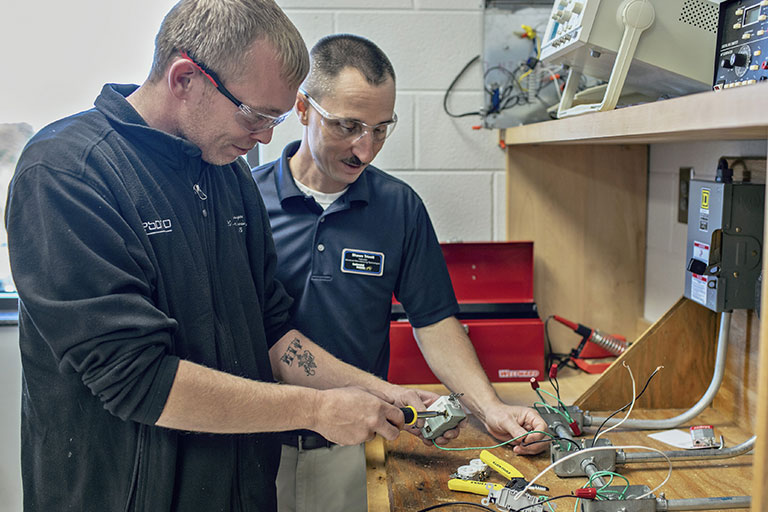Amp up your career with specialized training in electrical theory and hands-on practice to become an industrial or construction electrician.
What is Electrical Technology?
Like to think logically? Like to analyze problems? Like to find ways to use technology to solve them? We can teach you how! Prepare for entry-level positions in manufacturing facilities, the construction industry, and power plants.
Studying electrical theory & practical applications provides a foundation for an electrical industry career. Our classroom and lab instruction include:
- Basic electrical theory
- Residential and commercial wiring
- Conduit bending
- Motor controls
- Programmable logic controllers
You'll learn about electricity: how it's generated and transformed, and how to use it.
You'll also examine troubleshooting and problem-solving skills in the following:
- Electric motor controls
- Industrial electronics
- Fluid power
- Programmable logic controllers
- Process control
Electrical Programs
This program is for you if you desire to become a professional electrician.
We offer many options for degrees, diplomas, and certificates. The programs focus on three significant areas in electrical wiring and construction. The areas of specialization are Industrial Electrician, Construction Electrician, and Motor Control Electrician.
Electrical Contractor
Want to work as an Electrical Contractor? This program will help you to understand much more than you could with job experience alone.

Electricity has become an integral part of everyday life. An adequate electrical power supply is necessary. A reliable system for efficient use is essential, too. Because of this, there is a continuing need for qualified electrical technicians.
Graduates acquire the knowledge and skills for employment in such career areas as:
- Electrical Engineering
- Power Plant Technology
- Electrical Construction
- Industrial Maintenance
| Career | Average Wage (2010) |
|---|---|
| Electrical and Electronic Engineering Technician | $25.64 |
| Electrician | $20.63 |
The following degrees are offered for this program at the Leestown and Danville campuses:
- Associate in Applied Science (A.A.S.)
- Diploma
- Certificate
Getting Started
What are my degree, diploma, and certificate options?
The catalog describes the course requirements for completing the credential. Students are required to schedule an appointment with their assigned academic advisor to ensure achievement of their academic goals.
- Automated Industrial Controls Technician AAS
- Construction Electrician AAS
- Industrial Automation Process Control Technician AAS
- Industrial Automation Robotics Technician AAS
- Industrial Electrician AAS
- Automated Industrial Controls Technician Level 1 Certificate
- Automated Industrial Controls Technician Level 2 Certificate
- Construction Electrician Level 1 Certificate
- Construction Electrician Level 2 Certificate
- Construction Electrician Level 3 Certificate
- Industrial Automation Robotics Technician Level 1 Certificate
- Industrial Automation Robotics Technician Level 2 Certificate
- Industrial Electrician Level 1 Certificate
- Industrial Electrician Level 2 Certificate
How Do I Pay For This?
What Else Do I Need to Know?
Electrical Technology Dress Code
Because of safety and other concerns in the construction electricity worksite, a dress code has been established and will be enforced. Students not properly dressed will be asked to leave the lab area with the option to return in proper attire. Having to leave the lab area could result in being considered absent or tardy.
- Use of offensive, obscene, and/or abusive words or symbols on clothing is not permitted.
- This includes the use of emblems, insignias, badges, or other symbols or lewd or vulgar words where the effect is offensive to a reasonable person or otherwise causes disruption or interference with the orderly operations of the Advanced Manufacturing Center.
- BCTC faculty and staff may determine if an individual’s clothing violates any of the campus’ dress code.
- Generally, common sense and good taste should prevail in matters of dress.
- No shoes with holes (e.g., Croc-style shoes), no open-toed shoes, and no shoes without a closed heel are permitted.
- Leather shoes are preferred but are not required.
- Certain footwear may be required depending on the lab area. Please refer to the PPE Guide for the area you will be working.
- NO shorts or cropped pants are allowed.
- Jeans or khakis are acceptable if they have no major rips or tears.
- Tank tops, halter-tops, tube tops, and sleeveless shirts are unsafe and strictly prohibited.
- Long hair is to be put up or placed in a ponytail while in labs or near machinery. This is to protect the individual from serious injury.
- Ball caps and hoods may be worn if they are in accordance with the area PPE.
Note: Individual instructors may have more PPE guidelines, please view course syllabus.
Length of Program
You can earn an associate in applied science degree in two years if you maintain full-time status.
This information should not be considered a substitute for the KCTCS Catalog. You should always choose classes in cooperation with your faculty advisor to ensure that you meet all degree requirements.


